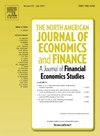International extreme sovereign risk connectedness: Network structure and roles
IF 3.8
3区 经济学
Q1 BUSINESS, FINANCE
North American Journal of Economics and Finance
Pub Date : 2025-01-01
DOI:10.1016/j.najef.2024.102355
引用次数: 0
Abstract
With network topology measures, we can model the global and individual properties of international extreme sovereign risk spillovers and understand how shocks propagate. Hence, using dynamic connectedness based on a TVP-VAR model, we construct daily extreme sovereign risk spillover networks based on defined extreme risk series among the G20. Our purpose is to creatively explore the network structures and describe international connectedness. We find that system- and country-level measures are all more sensitive to global systemic events, such as the COVID-19 pandemic. Country-level analysis shows that emerging countries such as Mexico, South Africa and European countries such as Spain emit and receive larger risk spillovers. Using the Logit and threshold regression, we creatively explore whether these system- and country-level measures can explain the probability of countries’ extreme sovereign risk outbreaks. The results show that system-level measures such as total risk spillover strength and country-level measures all play positive roles. Specifically, the greater the total risk spillover strength, the more central countries’ position and the greater the probability of countries’ extreme sovereign risk outbreak. Most importantly, their roles are the largest when the total risk spillover strength is at the middle level.
国际极端主权风险连通性:网络结构和作用
通过网络拓扑测量,我们可以对国际极端主权风险溢出的全局和个体属性进行建模,并了解冲击如何传播。因此,我们利用基于TVP-VAR模型的动态连通性,构建了基于已定义的G20极端风险序列的每日极端主权风险溢出网络。我们的目的是创造性地探索网络结构和描述国际联系。我们发现,系统和国家层面的措施都对全球系统性事件(如COVID-19大流行)更为敏感。国家层面的分析表明,墨西哥、南非等新兴国家和西班牙等欧洲国家排放和接受的风险溢出效应更大。使用Logit和阈值回归,我们创造性地探讨了这些系统和国家层面的措施是否可以解释国家极端主权风险爆发的概率。结果表明,总风险溢出强度等系统层面指标和国家层面指标均发挥了积极作用。具体而言,总风险溢出强度越大,国家处于中心位置,国家爆发极端主权风险的概率越大。最重要的是,当总风险溢出强度处于中等水平时,它们的作用最大。
本文章由计算机程序翻译,如有差异,请以英文原文为准。
求助全文
约1分钟内获得全文
求助全文
来源期刊
CiteScore
7.30
自引率
8.30%
发文量
168
期刊介绍:
The focus of the North-American Journal of Economics and Finance is on the economics of integration of goods, services, financial markets, at both regional and global levels with the role of economic policy in that process playing an important role. Both theoretical and empirical papers are welcome. Empirical and policy-related papers that rely on data and the experiences of countries outside North America are also welcome. Papers should offer concrete lessons about the ongoing process of globalization, or policy implications about how governments, domestic or international institutions, can improve the coordination of their activities. Empirical analysis should be capable of replication. Authors of accepted papers will be encouraged to supply data and computer programs.

 求助内容:
求助内容: 应助结果提醒方式:
应助结果提醒方式:


